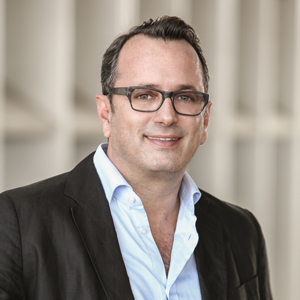Feb 12, 2019
Business in the age of content globalization according to Pierluigi Gazzolo, president of Viacom International Studios and EVP of Nickelodeon International.
MIAMI BEACH, Fla. -- Before Netflix brought Money Heist (from Spain), Fauda (from Israel) and Elite (from Spain) to worldwide audiences, shows rarely became a hit outside their home country, especially if they required subtitles. All that has changed, thanks to streaming services acquiring global content rights, a surprise to some industry observers.
"I've been wrong on Netflix’s international growth,” Michael Nathanson, senior research analyst and co-founder of MoffettNathanson, told attendees during a panel at the National Association of Television Program Executives (NATPE) conference in January. “What's changed most is the globalization of content. There are great shows being made in all parts of the world, and we in the states are overlooking international markets.”
Not Pierluigi Gazzolo. He’s made a career of developing and exporting Viacom content worldwide. A 25-year veteran of the company, Gazzolo is based in Miami, where he oversees the Americas and Spanish-language content in the U.S. He’s also head of Nickelodeon International, working closely with its newly-installed president, Brian Robbins, to export and import kids’ shows around the globe.
Most recently, he’s added studio head to his resume. Nickelodeon Latin America has produced kids’ shows since its Miami studio opened in 2015. So when Viacom purchased the Argentinian broadcaster Telefe and then Porta dos Fundos, a Brazilian YouTube comedy channel, they put the three together to create Viacom International Studios. VIS, as it’s known, is a development, production, and distribution studio that commissions and creates original content to sell, co-produce.


"“I think we should focus on doing what we know how to do best, which is to be a content company.”"
With viewers growing more comfortable watching content from all corners of the globe, Gazzolo says business is booming. Streaming platforms “have broken the barrier of local shows being watched in another language, in another culture, and we need to ride that wave.”
At NATPE, Gazzolo and his team announced six new co-productions to drive that growth. Among them, are Ana, about the daughter of a Mexican beauty queen trying to succeed in Hollywood, which will air on Comedy Central throughout Latin America later this year. And Resisitiré, based loosely on MTV’s Stranded With a Million Dollars, features 24 strangers abandoned in the Andes without water, food, shelter or the ability to communicate—but with half a million dollars in cash. It will be taped in Chile and will premier pan-regionally in March on Mega in Chile and MTV Latin America.
To better understand the content production model, here are some highlights from a wide-ranging conversation we had with Gazzolo in Viacom’s suite at NATPE about the evolving landscape of TV viewing and the opportunities ahead.
Viacom: Viacom is producing content and selling it to third parties via the studio model, which is in full swing at VIS and is being implemented in regions throughout the world. Can you explain the studio model and why it makes sense for Viacom?
Pierluigi Gazzolo: It's very hard to become a Netflix or a Comcast. I think we should focus on doing what we know how to do best, which is to be a content company. We own our content and where we put it is our prerogative. We have a bigger chance of survival by doing so.
Because we're still a company that owns networks, the studio model as we define it is when you consolidate all your development and production and separate them from other business, including your networks. It becomes an entity that develops and produces kick-ass content to sell to a third party or to Viacom channels. It’s sold either as a format concept, production or in the can (when it’s sold after being completed).
"Viacom International Studio can develop a show without it being network-focused, which will allow the format to be more attractive to other distributors."
In my division now, the brands become clients of the studio. Nickelodeon goes to Viacom International Studios and says, ‘I'm looking for a live action show about witches.’ The studio comes back with three ideas of a show about witches. Why is that better than the network doing it? Because Viacom International Studio can develop the show without it being network-focused, which will allow the format to be more attractive to other distributors after it appears on Nickelodeon.
V: Porta dos Fundos, the Brazilian YouTube Channel, was a big part of creating VIS. Will comedy that originated in Brazil translate to different parts of the world?
PG: Its comedies are universal. Before we acquired Porta, I took their sketches to Bob Bakish and he showed it to the board, and they all laughed just by looking at the subtitles. That convinced me that the humor is universal.
Porta created a new show, Homens, which means man in Portuguese. It’s Sex and the City for men. It's about the insecurities of men around women. There is a man dressed as a penis that is the subconscious of these guys because there is a storyline about one of them who cannot get it up, so he struggles. That show was acquired by Amazon for Latin America and will also be on Comedy Central in the region. We are also partnering with Amazon to do an output deal with Porta dos Fundos where we could potentially create multiple versions where, for example, Homens could become a format to be also sold outside of Latin America.
V: You mentioned subtitles. How do you decide if a show is dubbed, subtitled, or produced from scratch with a native cast?
PG: It's a huge topic and it depends on the channel and the genre. For kids, you have to dub it because parents want their kids to hear their own accent in animation, in particular. For Netflix’s Money Heist, it was so dramatic and action-driven that you had to hear the Spaniard passion in it. So you subtitle it. On the other hand, Turkish scripted shows which are more about the drama, I think you can dub.
"If you are a Viacom division, you own your content, so just go out and see what people say. That's how the studio was born."
V: You have a kid’s telenovela, Club 57, about siblings who time travel to 1957, that features singing and dancing. It was co-produced with an Italian company and it’ll air on Nickelodeon in Latin America and RAI in Italy. Why do you think this show will work for two seemingly disparate audiences?
PG: It is a music-based series that is aligned to our research that shows that music is important to tweens in Latin America, the U.S., Europe, and Asia. In the case of Latin America and Southern Europe, we also found out that there was an obsession with history and time travel. So we inserted time travel in the story. We also know that the '50s are seen as aspirational. So we put those three elements together and I think it's going to be a hit.
V: Viacom’s regional clusters are looking to the success of Latin America as they build their own studios. What advice do you have for them as they scale up?
PG: Don't plan it too much. Go with your ideas and your stories and your Bibles. (We call it a Bible when a show is being developed.) Start selling it, and when you see people biting, start producing it and selling it.
Secondly, development is king. Have a very strong development team and a writer's room that you own. Don't depend on third parties. These are the people that go with you to the pitches. They're the only ones that can sell the stories. You can give your salesperson the story, but they won't sell it like the creator of the story.
And the third piece—in our case we're not doing it yet, but I think we're going to have to—be the specialist of a certain type of content. Right now we're doing too much, but eventually, we're going to have to specialize. I think the specialty is going to be kids and drama.
The first one is the most important. Just plunge yourself and don't think about it too much. If you are a Viacom division, you own your content, so just go out and see what people say. That's how the studio was born.

